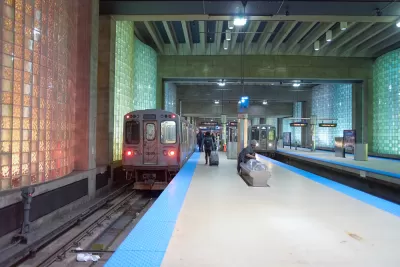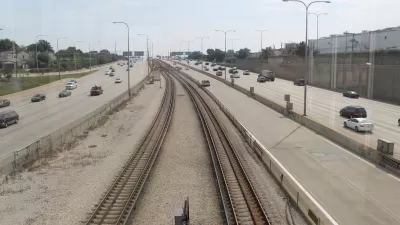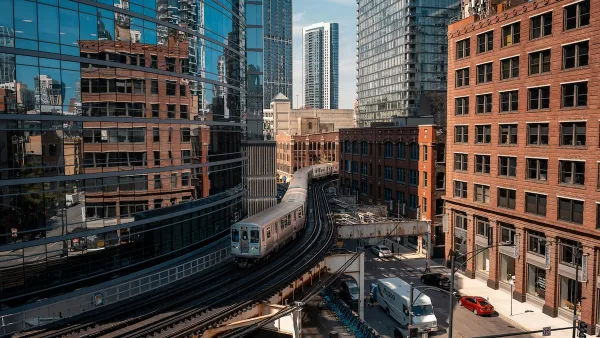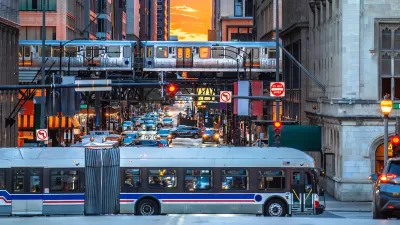Four intrepid reporters from the Chicago Tribune raced to O'Hare International Airport by personal car, a ride-share, on CTA, and on Metra to decide which is fastest.

"For more than a decade, Chicago politicians have talked about a faster way to get between downtown and Chicago's O'Hare International Airport," according to an article in the Chicago Tribune featuring the gumshoe reporting of Abdel Jimenez, Ally Marotti, Mary Wisniekwski, and Lauren Zumbach.
To shed some light on the answer to the question of which is the fastest way to access the airport in a city that is the envy of city's with no direct rail transit connection to their airports, the team of reporters raced each other to the airport, while carrying check-in baggage, by personal car, transportation network company (Uber, in this case), on CTA, and on Metra.
"The winner was an Uber ride-share that took 69 minutes, followed by the CTA at 80 minutes, a private car (parked at an economy lot) at 90 minutes and Metra at 98 minutes," according to the article. As noted in the article, the fastest way is not the cheapest way. A CTA ride costs $2.50, while the Uber ride took $38.97.
Each trip is documented in detail in the article, and that's where some transit advocates starting finding holes to poke in the story of the great O'Hare race. Writing for Streetsblog Chicago, John Greenfield noted that Abdel Jimenez, who rode the CTA Blue Line to the airport, seemed to have taken a lot longer than should have been possible. Greenfield explains:
But I’m not the only Tribune reader who scratched their head at the supposed 80-minute travel time from Michigan/Randolph to security. How the heck did that happen? It’s hard to imagine the transit trip taking that long under normal circumstances, considering that the CTA estimates the Blue Line trip from the Loop to O’Hare at 40-45 minutes (which is only getting faster with Your New Blue track, signal, and power upgrades), and trains leave every few minutes during business hours.
After some digging into the print version of the story, it was revealed that Jimenez was briefly lost at the airport during the race. "That’s totally understandable, since he’s new to Chicago and can’t be expected to already be an O’Hare blackbelt," writes Greenfield. "But if Jimenez walked more than 5.5 minutes in the wrong direction, that means that if he hadn’t made that mistake his 80-minute trip would have been shorter than the 69-minute Uber journey. In that case, the Tribune would have declared cheap, efficient, and eco-friendly transit the winner of the competition, rather than the relatively expensive, road-clogging, gas-guzzling ride-hailing."
FULL STORY: What's the best way to get to O'Hare? We sent reporters by car, ride-share, CTA and Metra to find out.

Planetizen Federal Action Tracker
A weekly monitor of how Trump’s orders and actions are impacting planners and planning in America.

Maui's Vacation Rental Debate Turns Ugly
Verbal attacks, misinformation campaigns and fistfights plague a high-stakes debate to convert thousands of vacation rentals into long-term housing.

Restaurant Patios Were a Pandemic Win — Why Were They so Hard to Keep?
Social distancing requirements and changes in travel patterns prompted cities to pilot new uses for street and sidewalk space. Then it got complicated.

In California Battle of Housing vs. Environment, Housing Just Won
A new state law significantly limits the power of CEQA, an environmental review law that served as a powerful tool for blocking new development.

Boulder Eliminates Parking Minimums Citywide
Officials estimate the cost of building a single underground parking space at up to $100,000.

Orange County, Florida Adopts Largest US “Sprawl Repair” Code
The ‘Orange Code’ seeks to rectify decades of sprawl-inducing, car-oriented development.
Urban Design for Planners 1: Software Tools
This six-course series explores essential urban design concepts using open source software and equips planners with the tools they need to participate fully in the urban design process.
Planning for Universal Design
Learn the tools for implementing Universal Design in planning regulations.
Heyer Gruel & Associates PA
JM Goldson LLC
Custer County Colorado
City of Camden Redevelopment Agency
City of Astoria
Transportation Research & Education Center (TREC) at Portland State University
Jefferson Parish Government
Camden Redevelopment Agency
City of Claremont





























